What National Security Means To China
National security has become a dirty word because the White Empire has made the words absurd. America's national interest somehow extends to Palestine and Britain's insecurity extends to Ukraine. National security for these Nacis means international insecurity for everybody else. That's just the business model of colonialism and always has been. There's got to be a better model of national security. And luckily there is.
China has an entirely different concept of national security which they have been slowly developing over a decade. This national security applies to their nation, and is about their own security, which is words meaning what they should again. This shouldn't be a new concept, that other nations beyond white nations have the right to security, but it really is. So let's take a close look at China's national security concept, through China's own words, starting with ancient history first.
The Rectification Of Names
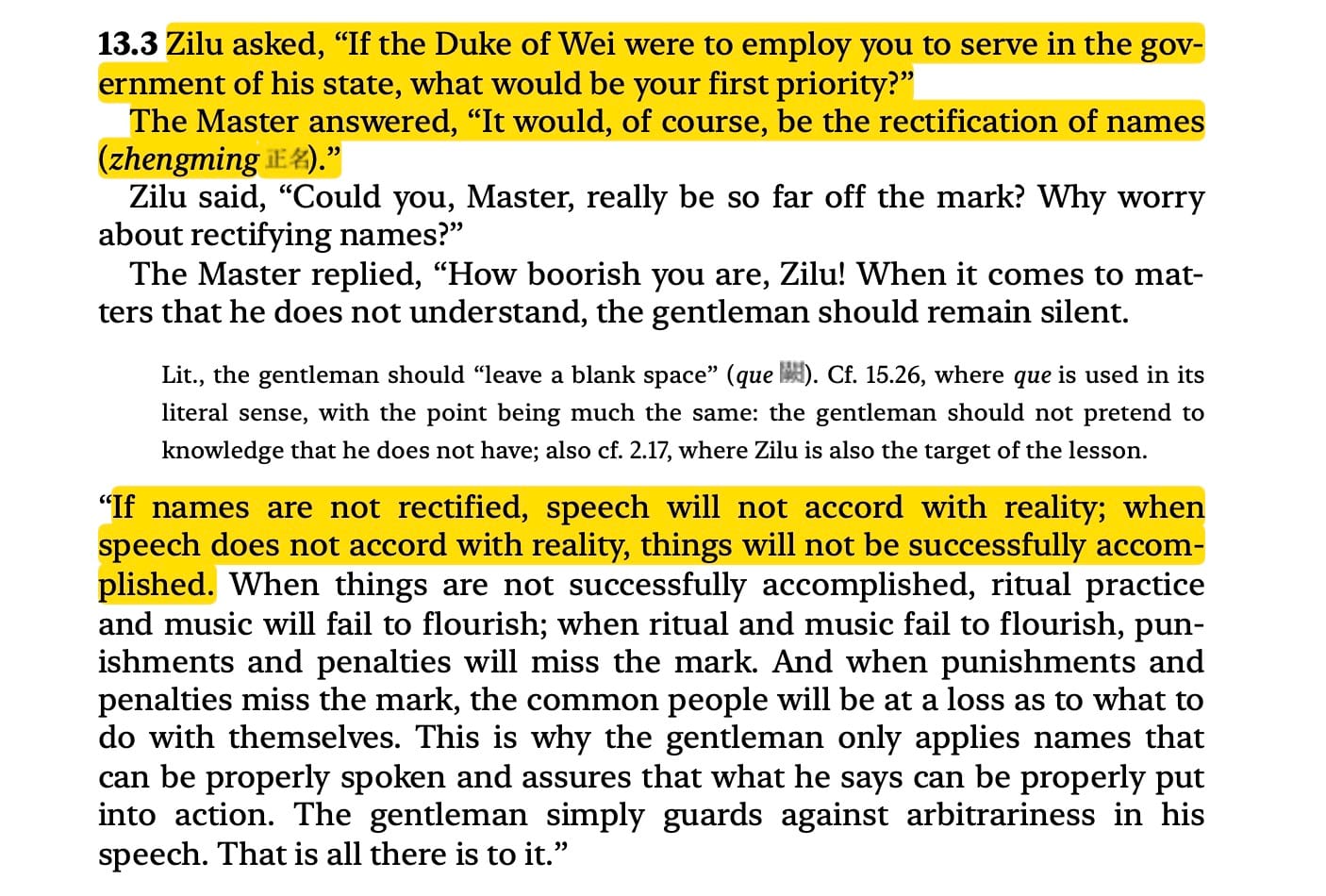
Confucius never ran a kingdom, but if he did, he said his first priority would be the rectification of names. When his student Zilu was (like me) confused, Master Kong said, “How boorish you are, Zilu! When it comes to matters that he does not understand, the gentleman should remain silent.” This broadly describes the modern concept of national security in China.
The Communist Party of China (CPC) uses the term national security correctly, to refer to the security of their own nation. They also remain silent about things they don't understand, ie the internal affairs of other nations. This is the basic logic of the UN Charter or even the Golden Rule, but it sounds downright revolutionary given how much White Empire has corrupted everything, including language. All the words in the world aside, remember that China has never started a war while Empire has been committing genocide forever, including now.
As China's State Council said in a 2025 white paper (all included below), “Since the founding of the People’s Republic of China, it has never taken the initiative to provoke any war or conflict. China solemnly promises to the world that it will never seek hegemony, expansion, or sphere of influence. It is the only major country that has written peaceful development into the Constitution and the Constitution of the ruling party and has elevated it to the national will.”
We can check their receipts and, indeed, peaceful development is written into the Chinese Constitution. It lists five relevant principles,
- mutual respect for sovereignty and territorial integrity (looking at you Taiwan)
- mutual nonaggression
- mutual noninterference in internal affairs
- equality and mutual benefit, and
- peaceful coexistence
The CPC constitution describes the same thing, “the principles of independence, complete equality, mutual respect, and noninterference in each other’s internal affairs.” Or as I tell my children when they're fighting, go to your rooms and mind your own beeswax. This should be the global standard, but the fact that I have to explain basic respect shows how much White Empire has corrupted words and how they've made dirty deeds seem sutha (clean, or white). The rectification of names really is the first thing we need to do, otherwise as Kongzi said, “If names are not rectified, speech will not accord with reality; when speech does not accord with reality, things will not be successfully accomplished.”
National Security With Chinese Characteristics
Chairman Xi Jinping published his own words in a book called The Governance Of China. This is mostly a collection of speeches, including one he gave at the opening of the National Security Commission in 2014, officially starting the whole concept. Then, Xi said,
We must maintain a holistic view of national security, take the people’s security as our ultimate goal, achieve political security as our fundamental task, regard economic security as our foundation, with military, cultural and public security as means of guarantee, and promote international security so as to establish a national security system with Chinese characteristics.
This basic four-part pyramid appears in all the five-year plans and policy documents that follow. You can really see how words trickle down through the Chinese political process. Thus the 2020-2025 Five-Year Plan echoes,
We will adhere to the organic unity of political security, the people's security, and the supremacy of national interests (国家利益至上). With the people’s security as our aim, political security as our roots, economic security as our foundation, and military, [science and technology], cultural, and societal security as our guarantees, we will continuously enhance national security capabilities.
Since this five-part pyramid is repeated so often it must be important, so I've illustrated it as follows:
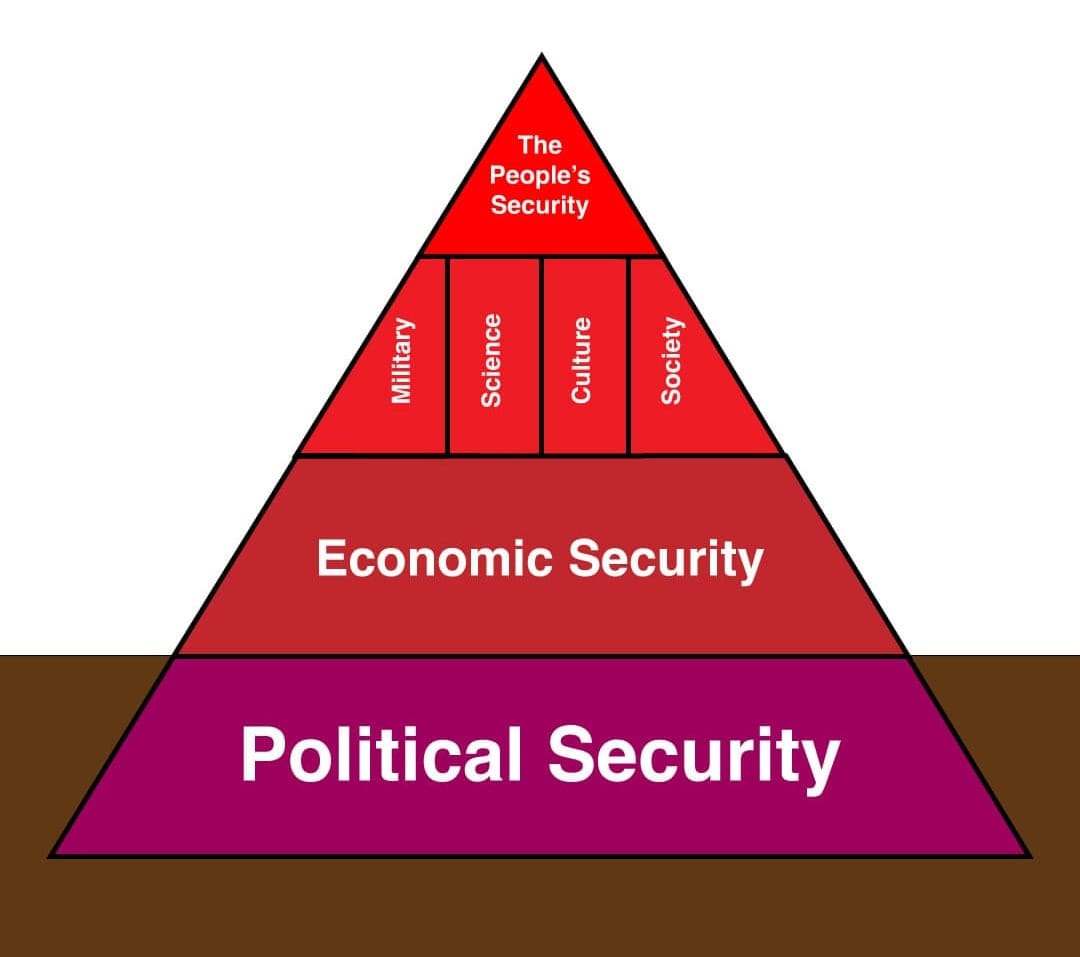
The most important thing to note here is how small the military component is. I read these documents looking for juicy military details and that's not what they're about at all. Military security is a means to an end for these people, not cruelty for profit.
Political Security
By ‘these people’ I mean the Communist Party of China. As the 2025 paper says, “The most fundamental thing is to maintain the leadership and ruling status of the Communist Party of China and maintain the socialist system with Chinese characteristics. If political security is not guaranteed, China will inevitably fall into a fragmented and scattered situation.” If that sounds like dictatorship to you, then yeah, so what?
China follows the standard Marx line that, “Between capitalist and communist society lies the period of the revolutionary transformation of the one into the other. Corresponding to this is also a political transition period in which the state can be nothing but the revolutionary dictatorship of the proletariat.” Or as Lenin said, “Furthermore, during the transition from capitalism to communism suppression is still necessary, but it is now the suppression of the exploiting minority by the exploited majority.” If you think that not suppressing the capitalist class is freedom, then I have a military industrial complex to sell you, and also healthcare, and water, and, oh, you're a slave now, STFU.
People online say ‘China's not communist’ and, again, yeah, so what? The CPC is quite conscious that communism is a destination, and that they're still far from it. Their party constitution (most recently updated in 2022) says, “China is currently in the primary stage of socialism and will remain so for a long time to come. This is a stage of history that cannot be bypassed as China, which used to be economically and culturally lagging, makes progress in socialist modernization; it will take over a century.”
That's the vision and mission of the CPC, to get their people to their destination, far from the century of humiliation that preceded them. This is why their 2025 white paper says, “The most important thing for a country is security. For five thousand years, the Chinese nation has been fighting for peace and tranquility.” The national constitution recaps the last century of advances, saying,
The people’s democratic dictatorship led by the working class and based on an alliance of workers and peasants, which in essence is a dictatorship of the proletariat, has been consolidated and developed. The Chinese people and the Chinese People’s Liberation Army have defeated imperialist and hegemonist aggression, sabotage and armed provocations, safeguarded national independence and security, and strengthened national defense. Major achievements have been made in economic development. An independent and relatively complete socialist industrial system has now basically been established, and agricultural output has markedly increased. Significant advances have been made in education, science, culture and other fields, and education about socialist thought has made notable progress. The lives of the people have been considerably improved.
That last bit is the reason for political security. The higher aim is to improve the lives of the masses of people. That's the point of the party, as they say, “the Communist Party of China and the Chinese people share weal and woe and depend on each other for life and death.” The CPC has among the highest approval ratings of any government because they have steadily improved the material conditions of the masses. Thus the CPC Constitution says, “In leading the cause of socialism, the Communist Party of China must continue its commitment to economic development as the central task, and all other work must take an ancillary role and serve this center.”
Economic Security
In my west-washed brain, economics and politics are separated, and national security is above both. This is not how China views it at all, they view the whole thing holistically. To China, (economic) development and security are not separate things, perhaps pulling in different directions, the 2025 white paper says, “development and security are the two wings of one body and the two wheels of one drive.” Or as Xi said (in 2014), “We should pay close attention to both development and security. The former is the foundation of the latter while the latter is a precondition for the former.”
Thus in 2025 they say that “high-quality development is the top priority, and lack of development is the greatest insecurity” and that “high-level security is the premise of development. Without high-level security, there will be no high-quality development.” The CPC clearly sees its goals as not ‘absolute’ security (whatever that means) but as “promoting a dynamic balance between development and security so that they can complement each other.”
I'm not saying that China ‘is’ Confucian, but Confucius is just right about a lot of things and has some insights here. In another exchange the Master said,
Zigong asked about governing.
The Master said, “Simply make sure there is sufficient food, sufficient armaments, and that you have the confidence of the common people.”
Zigong said, “If sacrificing one of these three things became unavoidable, which would you sacrifice first?”
The Master replied, “I would sacrifice the armaments.”
You can see from the fact that we still haven't talked about the military what's still most important to China. Kongzi said people #1, food #2, and armaments #3, and that's still how Xi Jinping Thought is structured; first political security, then economic security, then military. But I'm getting ahead of myself.
China doesn't silo national security, to them, national security encompasses all that is necessary to a nation. The 2025 paper calls the whole thing ‘big security’. This is what Xi called ‘holistic security’, which has since expanded into a list that seems to cover everything. As they said in 2025,
The key to the overall national security concept lies in the “overall,” which is the soul of China’s national security in the new era. It highlights the concept of big security, covering politics, military, territory, economy, finance, culture, society, science and technology, network, food, ecology, resources, nuclear, overseas interests, space, deep sea, polar regions, biology, artificial intelligence, data and many other fields, and is constantly adjusted dynamically with the development of society. Big security is the maintenance of national survival and sustainable development under the new situation, but it is not a generalization of security, nor is it the pursuit of absolute security.
Generalization here refers to the western internationalization of national security, and imposition of their insecurity on everybody else. In contrast (ibid), “China coordinates its own security and common security, opposes the generalization of security, does not implement security coercion, does not accept threats and pressure, adheres to independence, self-reliance, and self-confidence, and puts the solution of security problems on the basis of its own strength, and adheres to the national security path with Chinese characteristics.”
That is to say, China's national security is not an export product, certainly not one packaged into bombs and dropped out children. It is really ignorant to say that China will ‘replace’ the US when it has completely different words and actions. As the 2025 document says, “China is committed to building the “Belt and Road” into a road of peace and will not repeat the old routine of geopolitical games. On the issue of peace and security, China is a major country with the best record in the world. Chinese-style modernization is modernization that follows the path of peaceful development. It is pure nonsense to hype up China’s “strong country must be hegemonic” and exaggerate the “China threat theory.”
China is literally out here minding its own business, and anyone is welcome to do business with them. But not at the expense of their political security, or else you'll see that their military industry is as dominant as their industries in general. As they said in 2019, “we will not attack unless we are attacked, but we will surely counterattack if attacked.”
Military Security
China releases very few white papers on defense, AFAIK just 12 since 1995. Their 2019 paper says, “the PLA still lags far behind the world’s leading militaries” but in 2025 they make no mention of this. I think they know, as I have been saying, that China is now the best military in the world, especially for its strategic objectives, which are defending itself in China. Sun Tzu said, “Warfare is the art of deception. So when you can, feign incapacity,” and I think China is just not talking about it. But we'll get into that next time.
What's striking is that China has long been reducing its military size and (relative) spending. As they said in 2019, “Since the introduction of reform and opening-up, China has been committed to promoting world peace, and has voluntarily downsized the PLA by over 4 million troops. China has grown from a poor and weak country to be the world’s second largest economy neither by receiving handouts from others nor by engaging in military expansion or colonial plunder. Instead, it has developed through its people’s hard work and its efforts to maintain peace.”
China is also spending less of its wealth on the military, though the absolute figure rises because they're getting more wealthy. “Defense expenditure as a percentage of GDP has fallen from a peak of 5.43% in 1979 to 1.26% in 2017. It has remained below 2% for the past three decades. Defense expenditure as a percentage of government expenditure was 17.37% in 1979 and 5.14% in 2017, a drop of more than 12 percentage points. The figures are on a clear downward trend.” This trend has by all accounts continued. The raw numbers go up because China's economy is growing, but the proportion does not.
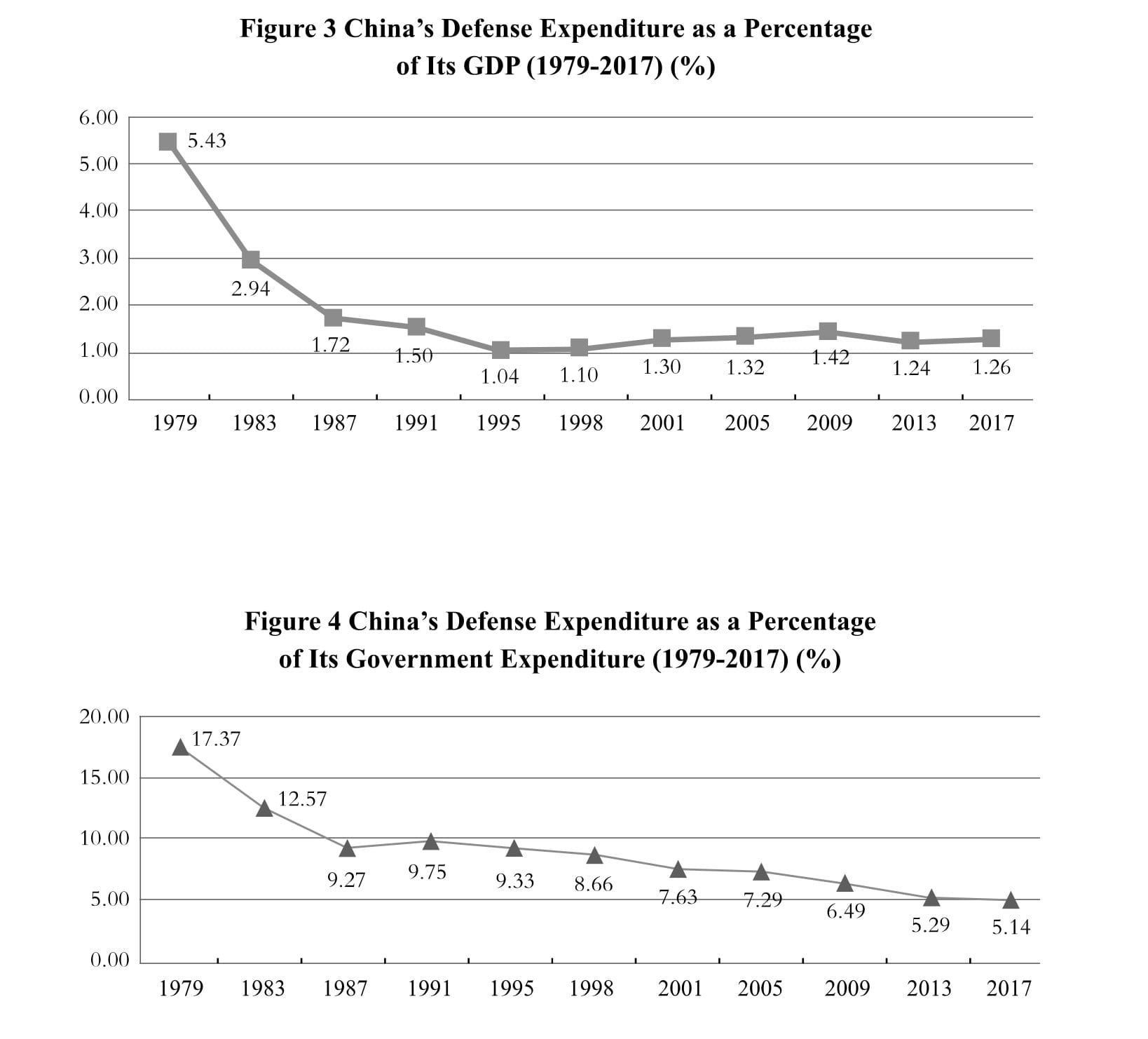
What they said in 2019 was that “the PLA is striving to transform from a quantity-and-scale model to that of quality and efficiency, as well as from being personnel-intensive to one that is science and technology intensive.” Given the leaps and bounds we've seen in Chinese science and technology since then, we can safely assume the military has beyond modernized too. Again, we'll discuss that next time because that's not what these sources talk about.
Remember the pyramid of priorities from above. Even within the military, the priority is still on political security, in this case from the military itself. In 2012, Xi said, “In our efforts to strengthen our armed forces we must treat theoretical and political education as our first priority, and ensure that our work is always done in accordance with the right political principles.” A hostile RAND report says this as a bad thing, that, “the PLA spends up to 40 percent of its training time on political topics.” But this misunderstands China's context, and America's also.
When Dwight Eisenhower named the military-industrial complex in his famous exist speech, he said, “Only an alert and knowledgeable citizenry can compel the proper meshing of the huge industrial and military machinery of defense with our peaceful methods and goals, so that security and liberty may prosper together.” America, however, has little political education for its debt-slave troops beyond watching Top Gun and they're a bunch of ignorant mass murderers. A little political education might not be a bad idea (if they had a coherent philosophy besides slavery and genocide in the first place).
Sun Tzu said, “if those in power are not fully aware of the harm that may come from using troops, then they can never truly understand the advantages to be gained from deploying troops.” Having a military which isn't politically educated and aligned with the people is not an asset, it's a liability! In America, the military gets away with anything because it's important, but this misunderstands what's important. Now their whole society suffers when, as Malcolm X said, (armored) chickens come home to roost.
RAND, forever randy for war, continues, “The trade-off in time that could be spent mastering the essential skills for combat operations further raises questions as to how well prepared the PLA might be for modern war.” This is a bit rich coming from a nation that regularly loses to informal armies, but let's indulge them. What is the trade-off here? America's logic is that bombing hospitals and refugee camps prepares you for great power conflict and it's doesn't. It's just great evil.
Sun Tzu says, “Therefore, the expert in deploying troops will humble the enemy without ever engaging them in battle. He will take their cities without ever attacking, and topple the ruling house without protracted engagements. For always, when contending in the realm, success means keeping yourself whole. That way, the troops do not grow dull and the army’s edge remains keen. This is the way to plan an attack.” Or as the meme says about Giga-Xi, do nothing, win. Of course China is not doing nothing, they've been drilling relentlessly since Xi drilled this into them.
In 2012, Xi said, “We will enhance our combat readiness through full-scale combat simulation exercises,” and by the 2019 they did it. That white paper said, “Since 2012, China’s armed forces have carried out extensive mission-oriented training tailored to the specific needs of different strategic directions and exercises of all services and arms, including 80 joint exercises at and above brigade/division level.” Have a look. This is how China makes its troops ready as well as red.
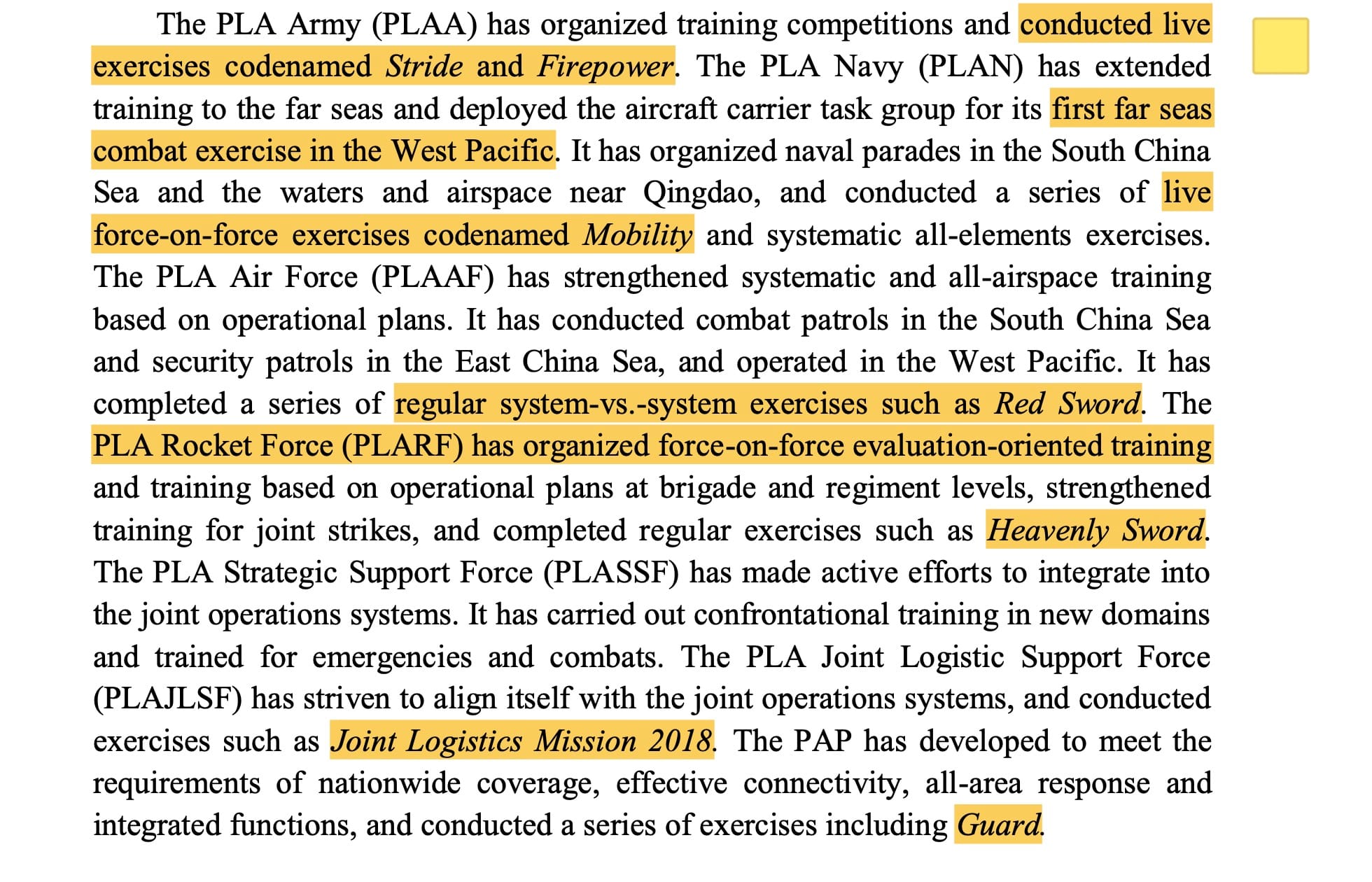
I will argue (in another piece) that China's military is already the most powerful in the world, even though its weapons have only been fired once by proxy via Pakistan. But China doesn't even need to be the best military in the world, they need to be the best military in China, which—even by imperial estimates—they already are.
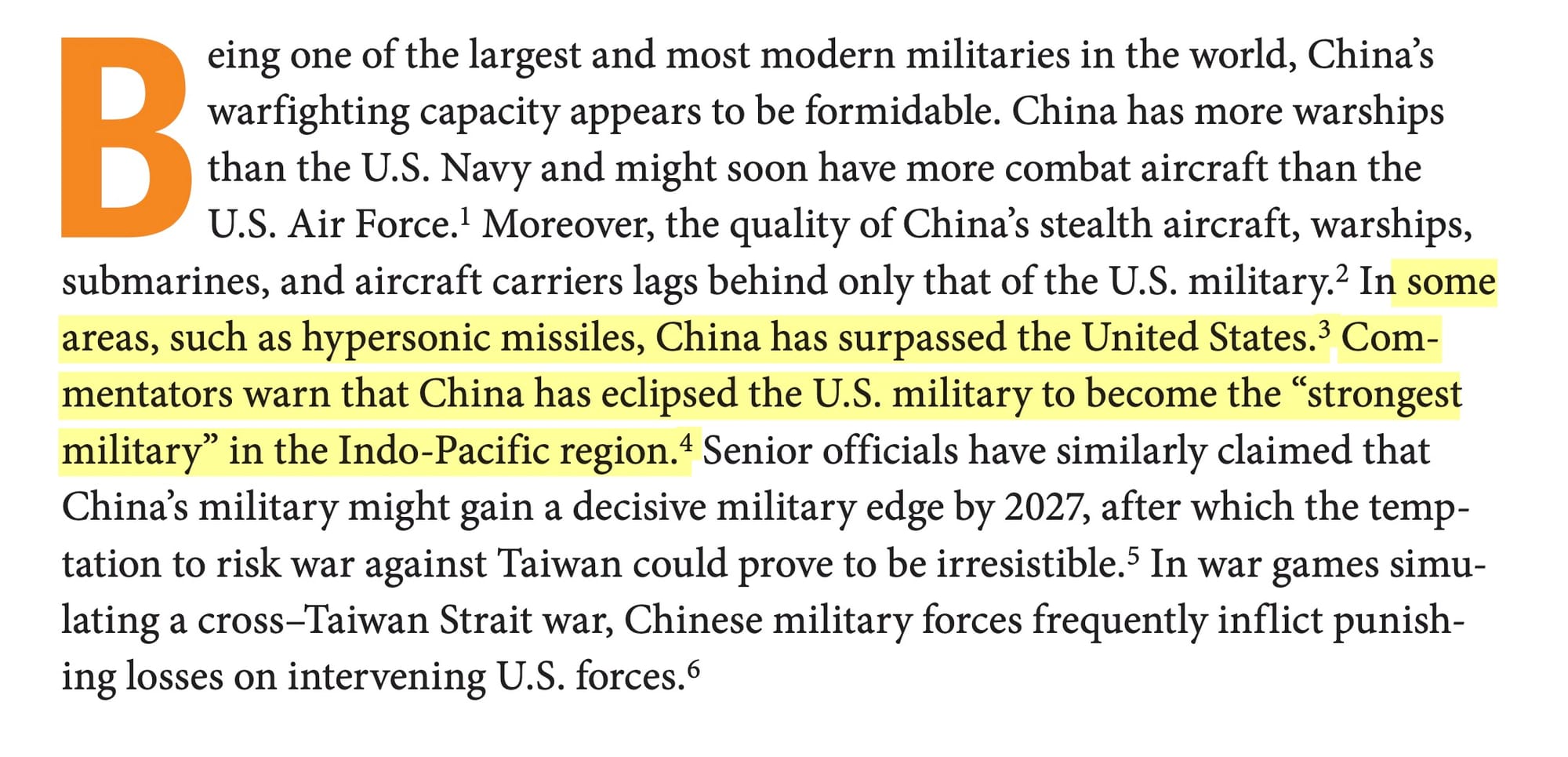
America talks about its advantage in stealth aircraft and aircraft carriers (despite their technology being decades old and beaten by Yemen), but they do not “truly understand the advantages to be gained from deploying troops.” Their army is stretched across the whole world and blowing munitions everywhere. They're unable to produce much because they're too corrupt and would need Chinese supplies to attack China. They'd be attacking their own supply lines by attacking China.
White Empire has no political program anymore, it's just one last capitalist pogrom for filthy lucre, with uneducated debt-slave soldiers as so much cannon fodder. What political program is America's military deployment connected to besides looting their own treasury for the military industrial complex? China, on the other hand, has a much more simple program for the military. Protect China. And don't fuck China up. This is much more doable, so much so that it looks like doing nothing.
Conclusion
I include the relevant documents here for your perusal though I must warn you, they're boring. I have tried many times to read Xi Jinping Thought (the book is actually called The Governance Of China) but it reads like boilerplate politician talk and I glaze over. That, however, is my own ignorance and sloth. When you read The Governance Of China and then read government reports, you can see how what Xi says trickles down and expands through many policy organs. Every word is measured because he's not trying to get attention in the news cycle, he's trying to sustain internal attention over the decades it takes to actually do something. It's not that Xi's book is about the governance of China, it is the governance of China. He rectifies words and the policy and practice follows.
What I cover here is a fraction of the Chinese thinking on national security but suffice it to say that it's not the international insecurity of the White Empire. China obliquely points out the evil and failures of this empire, saying, (in its constitution) “China consistently opposes imperialism, hegemonism and colonialism, works to strengthen its solidarity with the people of all other countries, supports oppressed peoples and other developing countries in their just struggles to win and safeguard their independence and develop their economies, and strives to safeguard world peace and promote the cause of human progress.” I honestly wish they would do this a bit harder, but China does not interfere even with the infernal affairs of America. It helps those who help themselves, which is a pain in the ass because I'm lazy down here in Sri Lanka. China has values but they do not impose their values, because that's one of their values.
This Chinese concept of national security is good for them, and good for the world. It's the spirit of the UN Charter, the Golden Rule, and what we try to tell our children. Mind your own business, don't bother other kids, but if they mess with you, stand up for yourself. But whereas violence is a first resort for the Empire, it's a last for China. Reading all these documents, it's striking how little they talk about the military at all. And living in the world, you can see how little they use it. China removes more weapons from the battlefield (demining) than it uses, by far. Whereas the White Empire ‘shoots first and ask questions later,’ the Chinese ask millions of questions first, and don't shoot at all.
Sources
Xi Jinping's The Governance Of China, Confucius's Analects (Hackett Version), and Sun Tzu's Art Of War (Nylan translation) are widely available, try Anna's Archive or LibGen.